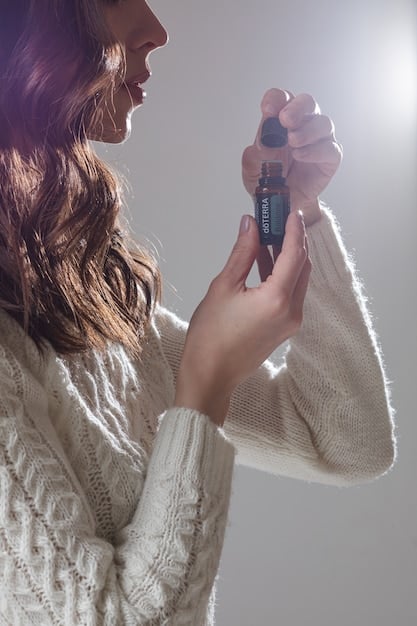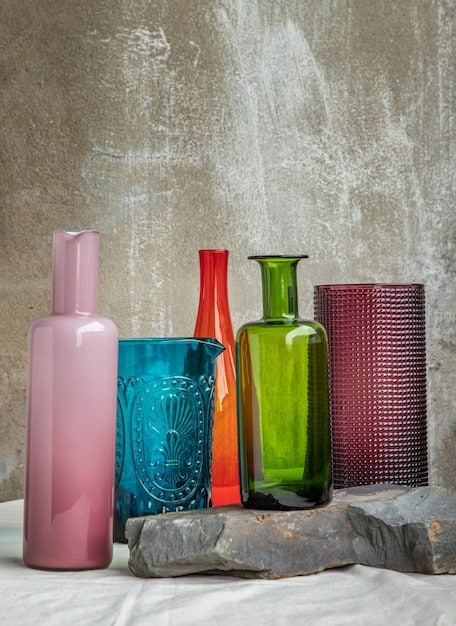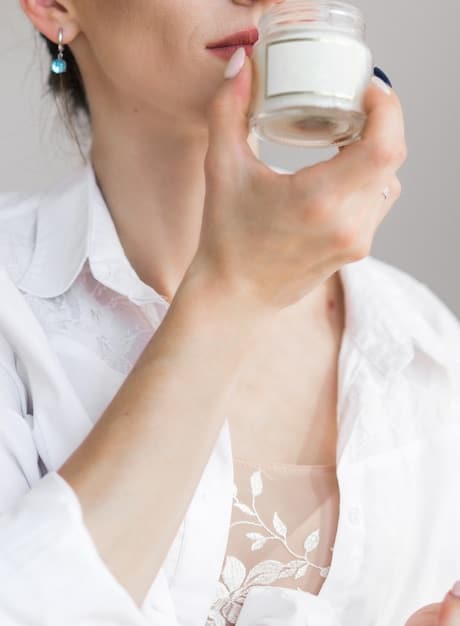Unlock Scent Longevity: Expert Tips to Make Perfume Last 8+ Hours

Unlocking scent longevity involves strategic application, proper storage, and understanding fragrance composition, ensuring your perfume lasts 8+ hours by targeting pulse points, moisturizing skin, and avoiding heat exposure.
Discover the secrets to making your favorite perfume last all day. Unlocking scent longevity: 3 expert tips to make your perfume last 8+ hours, ensuring you smell great from morning till night.
Understanding Perfume Longevity
Perfume longevity isn’t just about the quality of the fragrance; it’s about understanding how scents interact with your skin and the environment. Factors like skin type, application techniques, and even the weather can significantly impact how long a perfume lasts.
Let’s delve into the science behind perfume longevity and explore the elements that contribute to a lasting, delightful fragrance experience.
The Science Behind Scent Duration
The staying power of a perfume largely depends on its composition, specifically the concentration of fragrance oils. Perfumes are categorized by concentration, which influences both price and longevity.
- Parfum (Extrait de Parfum): Contains the highest concentration of fragrance oils (20-30%), offering the longest-lasting scent experience, often exceeding 8 hours.
- Eau de Parfum (EdP): A popular choice with a concentration of 15-20%, providing a good balance of longevity (4-5 hours) and affordability.
- Eau de Toilette (EdT): Contains 5-15% fragrance oils, typically lasting 2-3 hours, making it suitable for daytime wear.
- Eau de Cologne (EdC): The lightest concentration with 2-4% fragrance oils, offering a refreshing but short-lived scent, usually lasting up to 2 hours.
Beyond concentration, the specific fragrance notes—top, middle, and base—play a critical role in how a perfume evolves and endures. Top notes are the initial, fleeting scents; middle notes emerge as the top notes fade; and base notes provide the lasting foundation.

In summary, understanding perfume concentration and fragrance notes is key to selecting a perfume that aligns with your desired longevity. Opting for higher concentrations and perfumes with robust base notes ensures a longer-lasting scent that evolves beautifully throughout the day.
Expert Tip 1: Strategic Application for Maximum Impact
Where you apply your perfume can drastically affect how long it lasts. Strategic application involves targeting areas where your body heat naturally amplifies and diffuses the fragrance.
By applying perfume to these key spots, you create a longer-lasting and more noticeable scent trail.
Targeting Pulse Points
Pulse points are areas on your body where blood vessels are close to the skin’s surface, generating heat. These warm spots help to project the fragrance, making it last longer.
- Wrists: A classic and effective spot. Avoid rubbing your wrists together after applying perfume, as this can break down the fragrance molecules and shorten its lifespan.
- Neck: Applying perfume to the sides of your neck allows the scent to rise throughout the day, creating a subtle yet consistent aroma.
- Behind the Ears: This area is slightly warmer than other parts of your body, making it an ideal pulse point for perfume application.
- Inside Elbows: Another warm spot that helps to diffuse the fragrance as you move, enhancing its longevity.
Additionally, consider applying perfume to your hair, but do so sparingly. Spraying perfume directly onto dry hair can cause damage, so opt for a light mist or use a hair-specific fragrance. The hair’s texture can hold onto scent molecules, providing a lasting fragrance effect.
Ultimately, strategic application to pulse points maximizes the impact and longevity of your perfume. These warm spots amplify the fragrance, ensuring it lingers throughout the day and evolves beautifully with your body’s natural heat.
Expert Tip 2: The Power of Moisturizing
Moisturizing your skin before applying perfume can significantly enhance its longevity. Hydrated skin provides a better surface for fragrance molecules to adhere to, preventing them from evaporating quickly.
By creating a moisturized base, you ensure that your perfume lasts longer and smells richer, improving the overall fragrance experience.
Creating a Hydrated Base
Dry skin tends to absorb perfume, causing the scent to fade rapidly. Moisturizing helps to lock in the fragrance and prolong its duration.
Here’s how to create a hydrated base:
- Shower or Bathe: Start with clean, slightly damp skin. This allows moisturizers to penetrate more effectively.
- Apply a Fragrance-Free Moisturizer: Choose a lotion or cream that’s free of perfumes to avoid interfering with your chosen scent.
- Focus on Pulse Points: Pay extra attention to moisturizing areas like your wrists, neck, and inside elbows.
- Wait a Few Minutes: Allow the moisturizer to fully absorb into your skin before applying perfume.

Alternatively, consider using a scented moisturizer that complements your perfume. Layering similar scents can enhance the overall fragrance profile and extend its longevity. For example, if your perfume has floral notes, use a floral-scented lotion to amplify those notes.
In short, moisturizing your skin before applying perfume creates a hydrated base that locks in the fragrance and extends its longevity. This simple step ensures that your perfume lasts longer, smells richer, and provides a more enjoyable fragrance experience throughout the day.
Expert Tip 3: Proper Storage to Preserve Fragrance
How you store your perfume can significantly impact its quality and longevity. Proper storage protects the delicate fragrance oils from degrading due to heat, light, and humidity.
By storing your perfumes correctly, you can preserve their original scent and extend their shelf life, ensuring they remain as delightful as the day you bought them.
Protecting Fragrance from the Elements
Perfumes are sensitive to environmental factors that can alter their chemical composition and weaken their scent.
Here are key storage guidelines:
- Avoid Direct Sunlight: Store perfumes in a dark place, away from direct sunlight. UV rays can break down the fragrance molecules and change the scent.
- Keep Away from Heat: Heat can also degrade the fragrance oils. Avoid storing perfumes near radiators, windows, or in bathrooms where temperatures fluctuate.
- Maintain a Consistent Temperature: The ideal storage temperature for perfumes is between 60-70°F (15-21°C). This stable environment helps to preserve the fragrance’s integrity.
- Seal Tightly: Ensure the perfume bottle is tightly sealed when not in use. Exposure to air can cause the fragrance to evaporate and oxidize, altering its scent.
Many perfume enthusiasts recommend storing their fragrances in their original boxes. The box provides an extra layer of protection against light and temperature fluctuations. Another option is to store perfumes in a cool, dark closet or drawer, away from potential sources of heat and light.
In summary, proper storage is essential for preserving the quality and longevity of your perfumes. Protecting them from direct sunlight, heat, and humidity ensures that they retain their original scent and remain delightful for years to come.
Choosing the Right Perfume
Selecting a perfume that aligns with your body chemistry and lifestyle is crucial for maximizing its longevity. Different fragrances react differently on various skin types, and certain notes tend to last longer than others.
By understanding these factors, you can choose a perfume that not only smells great but also endures throughout the day, enhancing your overall fragrance experience.
Understanding Fragrance Families
Fragrances are categorized into families based on their dominant notes and characteristics. Knowing these families can guide you in selecting perfumes with lasting power.
- Oriental: Known for their rich, warm, and spicy notes, oriental fragrances often feature ingredients like amber, vanilla, and spices, offering long-lasting scents.
- Woody: Woody fragrances are characterized by earthy, grounding notes such as cedarwood, sandalwood, and vetiver. These scents tend to be long-lasting and provide a solid base for other fragrance families.
- Chypre: Chypre fragrances blend citrus top notes with a woody or mossy base, creating a complex and long-lasting scent profile.
Additionally, consider the concentration of fragrance oils in the perfume. As mentioned earlier, parfums and eau de parfums generally last longer than eau de toilettes and eau de colognes.
Ultimately, choosing the right perfume involves understanding fragrance families, considering scent concentration, and aligning your choice with your personal preferences. Opting for fragrances with strong base notes and higher concentrations ensures a longer-lasting and more impactful scent experience.
Lifestyle and Environmental Factors
Your lifestyle and the environment you’re in can significantly impact how long your perfume lasts. Factors like physical activity, weather conditions, and even your diet can affect your body’s natural scent and how it interacts with your perfume.
By making adjustments to your perfume application and choosing fragrances that align with your daily activities, you can optimize scent longevity and ensure you always smell your best.
Adapting to Different Environments
The environment plays a crucial role in how a perfume performs. Hot and humid weather can amplify scents, while cold weather may diminish them.
- Hot Weather: In warmer climates, opt for lighter fragrances with citrus or floral notes. Sweat can intensify scents, so avoid heavy, musky perfumes that may become overpowering.
- Cold Weather: In colder climates, richer and warmer fragrances like oriental or woody scents tend to last longer. The dry air can cause scents to fade more quickly, so choose perfumes with strong base notes.
Your diet can also influence your body’s natural scent. Foods with strong odors, such as garlic and onions, can alter your body’s aroma and affect how your perfume smells. Drinking plenty of water can help to maintain a neutral body scent, allowing your perfume to shine.
In sum, adapting your perfume choices and application to your lifestyle and environment is crucial for optimizing scent longevity. By considering factors like weather, physical activity, and diet, you can ensure that your perfume lasts longer and complements your natural scent, creating a harmonious and delightful fragrance experience.
| Key Point | Brief Description |
|---|---|
| 🎯 Strategic Application | Apply perfume to pulse points for maximum fragrance diffusion. |
| 💧 Moisturizing Skin | Hydrated skin helps perfume adhere, extending its longevity. |
| ☀️ Proper Storage | Store perfumes away from sunlight and heat to preserve their scent. |
| 👃 Fragrance Families | Choose oriental or woody scents for longer-lasting fragrance. |
Frequently Asked Questions (FAQ)
▼
Perfume can fade quickly due to dry skin, which absorbs the fragrance. Other factors include low concentration of fragrance oils, environmental conditions, and the perfume’s composition with fleeting top notes.
▼
In hot weather, opt for lighter, citrus-based fragrances. Apply to pulse points after moisturizing, avoid over-spraying, and consider carrying a travel-sized bottle for reapplication throughout the day.
▼
Spraying perfume on clothes can extend its longevity as fabric holds scent longer than skin. However, be cautious with delicate fabrics. Applying to skin allows the fragrance to mix with natural oils.
▼
Yes, storing perfume in the fridge can help prolong its life by protecting it from heat and light, which can degrade the fragrance oils. Just ensure it’s sealed tightly to prevent absorption of odors.
▼
Pulse points are warm areas on the body where blood vessels are close to the skin’s surface. Applying perfume to these spots helps to amplify the fragrance, making it diffuse better and last longer due to the heat.
Conclusion
By implementing these expert tips, you can significantly enhance the longevity of your favorite perfumes. From strategic application and proper moisturizing to smart storage and fragrance selection, each step contributes to a lasting and delightful scent experience that keeps you smelling great all day long.





